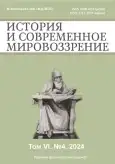Position crime during the Great Patriotic War
- Authors: Pass A.A.1
-
Affiliations:
- Chelyabinsk State University
- Issue: Vol 6, No 4 (2024)
- Pages: 64-73
- Section: SOCIOCULTURAL COMMUNICATIONS IN THE PAST AND PRESENT
- URL: https://journal-vniispk.ru/2658-4654/article/view/281047
- DOI: https://doi.org/10.33693/2658-4654-2024-6-4-64-73
- EDN: https://elibrary.ru/TJDGNE
- ID: 281047
Cite item
Abstract
The article examines the phenomenon of economic crime among executives of government bodies, institutions and enterprises of various departmental affiliations in the context of social upheavals caused by the consequences of total war. The most common types of torts are characterized. The circumstances and motives that prompted the commission of acts dictated by selfish considerations and entailing administrative or criminal penalties are analyzed. The measures of influence from the Party Control Commission and justice bodies against subjects who violated the established rules and regulations are presented. The behavioral strategies that were used by the latter in order to resolve the legal conflicts that arose are described. The reasons that contributed to the mitigation or cancellation of punishment for the offenders are clarified. It is established that membership in the All-Union Communist Party (Bolsheviks), official status, professional qualifications and past merits were factors that facilitated both the organization of economic crimes and the evasion of responsibility in the event of possible exposure. From the perspective of criminal economic anthropology, criteria are proposed for determining the types of embezzlers of state property.
Full Text
##article.viewOnOriginalSite##About the authors
Andrey A. Pass
Chelyabinsk State University
Author for correspondence.
Email: pass_andrey@mail.ru
SPIN-code: 6204-4262
Dr. Sci. (Hist.), Professor of the Department of Political Sciences and international relations
Russian Federation, ChelyabinskReferences
- Latov Iu.V. The economy is illegal: Essays on the theory and history of the shadow economy. Moscow, 2001.
- Mardanov A.B. Criminal economic anthropology as a direction of domestic criminology. St. Petersburg, 2014.
- Olimpieva I. B., Pachenkov O.V. Corruption, anti-corruption and the position of a social scientist // Fighting windmills? Socio-anthropological approach to the study of corruption // Fighting windmills? A socio-anthropological approach to the study of corruption. St. Petersburg, 2007. Pр. 6–15.
- Pass A.A. «Other» economy: production and trade cooperatives in the Urals in 1939–1945. Chelyabinsk, 2002.
- Pass A.A. Economic crime during the Great Patriotic War (according to the pages of the journal «Socialist Legality» 1941–1945) // Bulletin of SUSU. The series «Social and humanitarian sciences». № 2, 2019. Pp. 29–33.
- Pushkarev V.S. «The Black Market in the USSR during the Great Patriotic War and Its Impact on the State of the Country’s Domestic Market» // Economic Journal. № 12, 2006. Pp. 212–225.
- Rybakov V. People's Commissariat of Justice of the RSFSR and the management of judicial bodies in 1941–1945 // Russian History. № 3, 2023. Pp. 51–61.
- Senyavskij A.S. –Great challenges in the Imperial and Soviet History of Russia: comparative analysis // Ural Historical Bulletin. № 2(59), 2018. Pp. 39–48.
- Sushkov A.V. The Case of the «Tank King» I. Zaltsman. Yekaterinburg, 2016.
- Belova E., Lazarev V. Selective Justice: Party Control Under Stalin // PERSA Working Paper. № 58, 2009. 42 p.
- Gorlizki Y. Theft Under Stalin: A Property Rights Analysis // PERSA Working Paper. № 10, 2001. 31 p.
- Heinzen J. Informers and the State under Late Stalinism Informant Networks and Crimes against «Socialist Property». 1940–1953. // Kritika: Explorationsin Russian and Eurasian History. 2007. Vol. 8. № 4. РP.789–815.
- Harrison M. Forging Success: Soviet Managers and Accounting Fraud, 1943 to 1962 // Journal of Comparative Economics. 2011. Volume. 39. Issue 1. Р. 43–64.
Supplementary files








